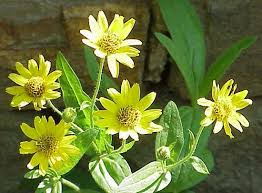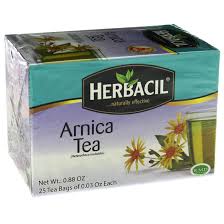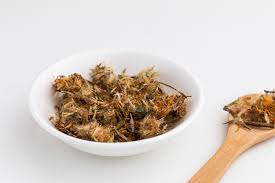Arnica is a special herb with strong healing abilities that people have cherished for ages. This amazing plant, known scientifically as Arnica montana, comes from the mountains in Europe and has found its way into the hearts and homes of people worldwide.
Long ago, the ancient Greeks and Romans already knew about Arnica. They used it as medicine to treat different health problems. The name “Arnica” might come from the Greek word “arnakis,” which means “lamb.” This could be because Arnica leaves feel soft and fluffy like a lamb.
Arnica is famous for its ability to ease pain, reduce swelling, and help bruises and wounds heal. This plant contains a powerful substance called helenalin, which can calm inflammation and numb pain. When we put Arnica on our skin using creams or gels, it can really help with pain and swelling from injuries and arthritis.
Arnica’s soothing and healing qualities are also good for our skin. People use it in creams and lotions to treat skin issues like eczema, acne, and dermatitis. Arnica’s anti-inflammatory powers can make irritated skin feel better, and its natural germ-fighting abilities can help prevent infections.
Arnica plays a big role in homeopathy, which is a natural way of healing. In homeopathy, Arnica is used in very tiny amounts to help the body heal itself. People use it for all sorts of things, like soothing sore muscles or helping with emotional stress.
People who love sports and exercise have discovered that Arnica can help with sore muscles and stiffness. Whether you’re a pro athlete or just enjoy working out, using Arnica-based products after exercise can be really helpful.
Even though Arnica is a wonderful natural remedy, it’s important to be careful with it. Only use it on your skin – never eat it because it can be harmful. Also, if you’re allergic to plants like ragweed, marigolds, or daisies, be cautious when using Arnica.
In a world full of medicines with chemicals and skin products with lots of additives, Arnica shines as a natural healer. Its long history and many uses make it a favorite for those who prefer natural remedies. From soothing sore muscles to taking care of our skin, Arnica is indeed one of nature’s best gifts.
In Arnica, we see how nature has the power to heal. This simple herb keeps reminding us of the incredible ways nature can help us stay healthy and feel good.
Read Also: Soil Test Correlation and Calibration
11 Health Benefits Associated with Arnica

Arnica herb, scientifically known as Arnica montana, offers a range of health benefits due to its natural healing properties. Here are 11 notable health benefits of Arnica:
1. Pain Relief: Arnica is renowned for its analgesic properties. It can effectively alleviate pain associated with injuries, sore muscles, and even post-surgical discomfort when applied topically in the form of creams or ointments.
2. Anti-Inflammatory: Arnica contains helenalin, a compound with potent anti-inflammatory effects. It can reduce swelling and inflammation, making it valuable for conditions like arthritis and sprains.
3. Bruise Reduction: Applying Arnica topically can help reduce the appearance of bruises and accelerate the healing process. It does this by promoting better blood circulation in the affected area.
4. Wound Healing: Arnica can aid in wound healing. Its antibacterial properties may help prevent infection, while its ability to reduce inflammation can speed up the body’s natural healing mechanisms.
5. Arthritis Relief: People with osteoarthritis or rheumatoid arthritis may find relief from joint pain and stiffness by using Arnica-based products. These products can enhance mobility and comfort.
6. Skin Care: Arnica is used in skincare products to address various skin issues, including acne, eczema, and dermatitis. Its anti-inflammatory and antimicrobial properties can soothe irritated skin.
7. Insect Bite Relief: Arnica’s soothing properties can provide relief from itching and discomfort caused by insect bites and stings. It can reduce inflammation and minimize the urge to scratch.
8. Muscle Soreness: Athletes and fitness enthusiasts often turn to Arnica for alleviating muscle soreness and stiffness after workouts. It can help reduce post-exercise discomfort.
9. Hair Care: Arnica is sometimes used in shampoos and conditioners to promote hair growth and maintain a healthy scalp. It may improve blood circulation to hair follicles.
10. Headache Relief: Arnica-infused oils or balms can be gently massaged onto the temples and neck to help relieve tension headaches. Its calming properties may provide comfort during a headache.
11. Homeopathic Use: In homeopathy, highly diluted Arnica remedies are employed to address emotional and physical trauma, shock, and injuries. Homeopathic Arnica can assist the body in healing and recovery.
It’s important to note that while Arnica offers numerous benefits, it should be used with caution. Always follow recommended dosages and consult a healthcare professional, especially if you have allergies or are pregnant or nursing. Arnica should not be ingested in its raw form, as it can be toxic. When used appropriately, Arnica can be a valuable addition to natural healthcare routines for various conditions.
Scientific Evidence and Case Studies on Arnica Herb
1. Anti-inflammatory Effects: Studies have shown that arnica (Arnica montana) contains sesquiterpene lactones such as helenalin, which exhibit strong anti-inflammatory properties useful in treating bruises, sprains, and muscle soreness.
2. Pain Relief Benefits: Research indicates that topical application of arnica gels or creams can help relieve pain associated with arthritis, joint stiffness, and post-exercise muscle fatigue.
3. Wound Healing Support: Evidence suggests that arnica enhances local blood circulation and promotes tissue regeneration, aiding in the healing of minor wounds and bruises.
4. Antioxidant Activity: Experimental studies reveal that arnica possesses natural antioxidants that help protect cells from oxidative stress and reduce tissue damage.
5. Post-surgical Recovery: Clinical observations have found that using arnica preparations after surgery can help reduce swelling, bruising, and discomfort, supporting faster recovery.
Nutritional Value Of Arnica Herb
1. Flavonoids: Arnica contains flavonoids that provide antioxidant and anti-inflammatory benefits, protecting cells from oxidative damage.
2. Sesquiterpene Lactones: These compounds are responsible for arnica’s pain-relieving and anti-inflammatory properties.
3. Tannins: Arnica offers tannins that help tighten tissues, support wound healing, and act as natural astringents.
4. Essential Oils: The herb contains essential oils that contribute to its soothing aroma and topical healing effects.
5. Phenolic Acids: These compounds help neutralize free radicals and support skin repair.
6. Carotenoids: Arnica provides carotenoids, which promote healthy skin and protect against environmental damage.
7. Inulin: It contains inulin, a plant-based polysaccharide that supports immune health and may aid digestion when used in small, controlled amounts.
Read Also: Soil Sampling Procedures
Arnica Tea

Arnica tea is a soothing and aromatic beverage that has been enjoyed for centuries due to its potential health benefits and unique flavor. This herbal tea is derived from the dried flowers of the Arnica montana plant, which is native to Europe and parts of North America.
Arnica montana, also known as mountain arnica or leopard’s bane, has a long history of traditional use in herbal medicine. The bright yellow flowers of the arnica plant have been utilized for their therapeutic properties by various cultures, including Native American tribes and European herbalists. These flowers were often dried and brewed into a tea, creating what we now know as Arnica tea.
Arnica tea boasts a unique flavor profile that can be described as earthy, slightly bitter, and subtly floral. Its aroma is delicate and herbal, making it an inviting choice for those seeking a soothing and aromatic herbal tea experience. The distinct taste of Arnica tea is not only enjoyable but also contributes to its potential health benefits.
Health Benefits of Arnica Tea

Arnica tea is primarily renowned for its potential medicinal properties. It is important to note that while Arnica tea may offer several health benefits, it should be consumed in moderation and under the guidance of a healthcare professional, as excessive consumption can lead to adverse effects.
1. Anti-Inflammatory Properties: Arnica tea contains compounds that are believed to have anti-inflammatory properties, which may help reduce swelling and pain when applied topically.
2. Pain Relief: Traditionally, Arnica tea has been used to alleviate muscle aches and joint pain. Some people find it helpful in managing pain associated with conditions like arthritis.
3. Skin Health: Arnica tea is occasionally used topically to promote the healing of bruises, wounds, and skin irritations. It is essential to dilute Arnica tea before applying it to the skin, as it can be irritating in its concentrated form.
4. Antioxidant Content: Like many herbal teas, Arnica tea contains antioxidants that can help combat oxidative stress in the body.
5. Digestive Aid: In some cultures, Arnica tea has been consumed to aid digestion and relieve mild stomach discomfort. However, its use for this purpose is not well-documented.
How to Prepare Arnica Tea

Preparing Arnica tea is a simple process that requires dried Arnica montana flowers. Here is the basic recipe:
Ingredients

1 teaspoon dried Arnica montana flowers
8 ounces (1 cup) of boiling water
Instructions
1. Place the dried Arnica flowers in a teapot or tea infuser.
2. Pour the boiling water over the flowers.
3. Allow the tea to steep for 5-10 minutes, depending on your taste preferences.
4. Strain the tea into a cup.
5. Optionally, you can sweeten the tea with honey or add a slice of lemon for extra flavor.
While Arnica tea may offer potential health benefits, it should be used with caution and under the guidance of a healthcare professional. Arnica should never be ingested in its undiluted form, and excessive consumption can lead to adverse effects such as nausea, vomiting, and dizziness.
In conclusion, Arnica tea is a unique herbal beverage with a long history of traditional use for its potential health benefits. Its distinct flavor and aroma make it a delightful choice for those seeking a soothing and aromatic tea experience. However, it is crucial to approach Arnica tea with caution, ensuring that it is used safely and in moderation, especially when considering its potential medicinal properties.
Frequently Asked Questions About Arnica Herb
1. What is arnica herb?
Arnica is a flowering herb native to Europe and North America, traditionally used to reduce pain, bruising, and inflammation.
2. What are the main uses of arnica?
It is primarily used topically for treating bruises, sprains, muscle soreness, and joint pain.
3. Can arnica be taken internally?
No, arnica should not be consumed orally as it can be toxic; it is safe only in topical or homeopathic preparations.
4. Is arnica effective for bruises?
Yes, applying arnica gel or cream helps reduce bruising and speeds up healing by improving local blood flow.
5. Can arnica relieve arthritis pain?
Yes, studies suggest that arnica gel may provide pain relief comparable to some nonsteroidal anti-inflammatory creams for mild arthritis.
6. Is arnica safe for the skin?
Yes, arnica is safe for topical use on unbroken skin, but it should not be applied to open wounds or cuts.
7. Does arnica have anti-inflammatory properties?
Yes, arnica’s helenalin compound has been proven to reduce inflammation and swelling effectively.
8. Can arnica help with muscle recovery?
Yes, applying arnica after intense exercise can help reduce muscle soreness and promote faster recovery.
9. How often can I use arnica cream?
It can be applied 2–3 times daily on the affected area, depending on the product instructions.
10. Can arnica be used during pregnancy?
Arnica should be used with caution during pregnancy and only under the advice of a healthcare professional.
Do you have any questions, suggestions, or contributions? If so, please feel free to use the comment box below to share your thoughts. We also encourage you to kindly share this information with others who might benefit from it. Since we can’t reach everyone at once, we truly appreciate your help in spreading the word. Thank you very much for your support and for sharing!
Disclaimer: This article is for educational and informational purposes only. The health benefits described are based on scientific research and traditional knowledge. They are not a substitute for professional medical advice, diagnosis, or treatment. Always consult a healthcare professional before using any herb or natural remedy for medical purposes.
Read Also: What Can I Do With An Agriculture Degree?

